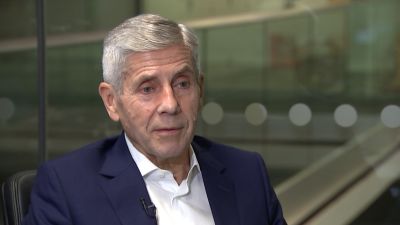Former M&S boss Lord Stuart Rose expects this Christmas to be as brutal for retailers as last

The former chief executive of Marks and Spencer says Christmas trading is currently “tough” and he expects more retailers to fail in the New Year.
Lord Rose told ITV News that the popularity of shopping on the Internet, the mixed weather and the increased uncertainty surrounding Brexit are having an impact on consumer spending.
“I think this is a tough Christmas,” Rose said. “I’m going to put my money where my mouth is. I suspect there will be some uncomfortable trading statements in the early part of January.”
Rose believes that while budget retailers like Aldi and Lidl continue to prosper and high-end brands are “doing ok”, in the middle market, retailers are getting squeezed. In food, electronics and in clothing there is “too much capacity; too many shops chasing too few pounds.”
Rose agrees that the retail sector has experienced “a bit of a bloodbath” in 2018 with a string of high profile insolvencies. He expects 2019 to be a year of further upheaval. “Why would it get any better? I can see no reason why it will get any easier,” he said. “Somebody will have an accident next year, definitely”.
This morning Carpetright reported a loss of £11.7 million for the six months to the end of October but claimed there were signs its turnaround plan is working. The company’s share price has collapsed from 150 pence to 17 pence in the last 12 months.
This is a crucial time of year for retailers, they need to fill their tills in the run up to Christmas.
The John Lewis Partnership - which owns Waitrose - revealed that sales last week were down 3.8% on last year. Across its department stores the fall in sales was 5.1%. In four of the last five weeks the partnership’s total sales have been lower than both last year and the year before.
All is not lost, there are still two weeks to go before Christmas but these are terrible numbers and suggest Rose may be right.
Rose also suggests that the concept of the department store may have had its day - pointing to the failure of House of Fraser in the summer and the struggles that Debenhams is experiencing as evidence that the business model looks vulnerable in the digital age.
“It’s true to say that the day in the life of the department stores is probably coming close to an end,” Rose said. ”We know how expensive it is to manage big space. It tends to be the case that the big space retailers have been the last ones to espouse properly the online situation, believing they could attract people into their shops. But it’s getting tougher and tougher every single day.”
House of Fraser is now owned by Mike Ashley’s Sports Direct Group. Last week Ashley told a select committee of MPs that the Internet is “killing the high street.” Rose thinks that view is too simplistic. He argues that while consumers are increasingly shopping online they are also spending their money on different things - more on holidays, less on clothing. Rose believes that when companies fail, it’s often because they’ve been badly run.
“It is easy to blame what is happening in the sector in terms of channel shift, disintermediation,” said Rose. “Actually [failed retailers] should look in the mirror and say what didn’t I do that I should have done. 90% of the time they could have done more self-help.”
Many established retailers argue that the tax system is accelerating the pace of shop closures by handing an unfair competitive advantage to online retailers. Rose agrees that the system of Business Rates needs updating but suggests that retailers like Fat Face - which he chairs - are proof that it is still possible to compete with Amazon.
“We have bricks and mortar stores and a very healthy online business, thank you very much” he said. “We fish in both ponds and that’s what retailers need to do.”
Rose will be remembered by many people as the chairman of Britain Stronger in Europe, the man who spearheaded the unsuccessful campaign to stay in the European Union. He says he’s still a Remainer at heart but he’s now endorsing the deal the Prime Minister is struggling to get parliament to approve.
“My first choice is Remain, that’s not going to happen. My second choice is the deal that we’ve got on the table,” Rose explained. “I’m endorsing the Prime Minister’s deal because I’m a pragmatic businessman. The deal on the table is the best we can get out of the Europeans, it’s the best deal we can negotiate for ourselves and I don’t like the consequences of not having a deal.”
In recent weeks a number of prominent business leaders who also supported the Remain campaign have publicly backed the Prime Minister’s Withdrawal Agreement, including Diageo, BAE, Rolls Royce and Airbus. To little effect thus far. Theresa May’s deal is in deep trouble and looks unlikely to clear the Commons in its current form.